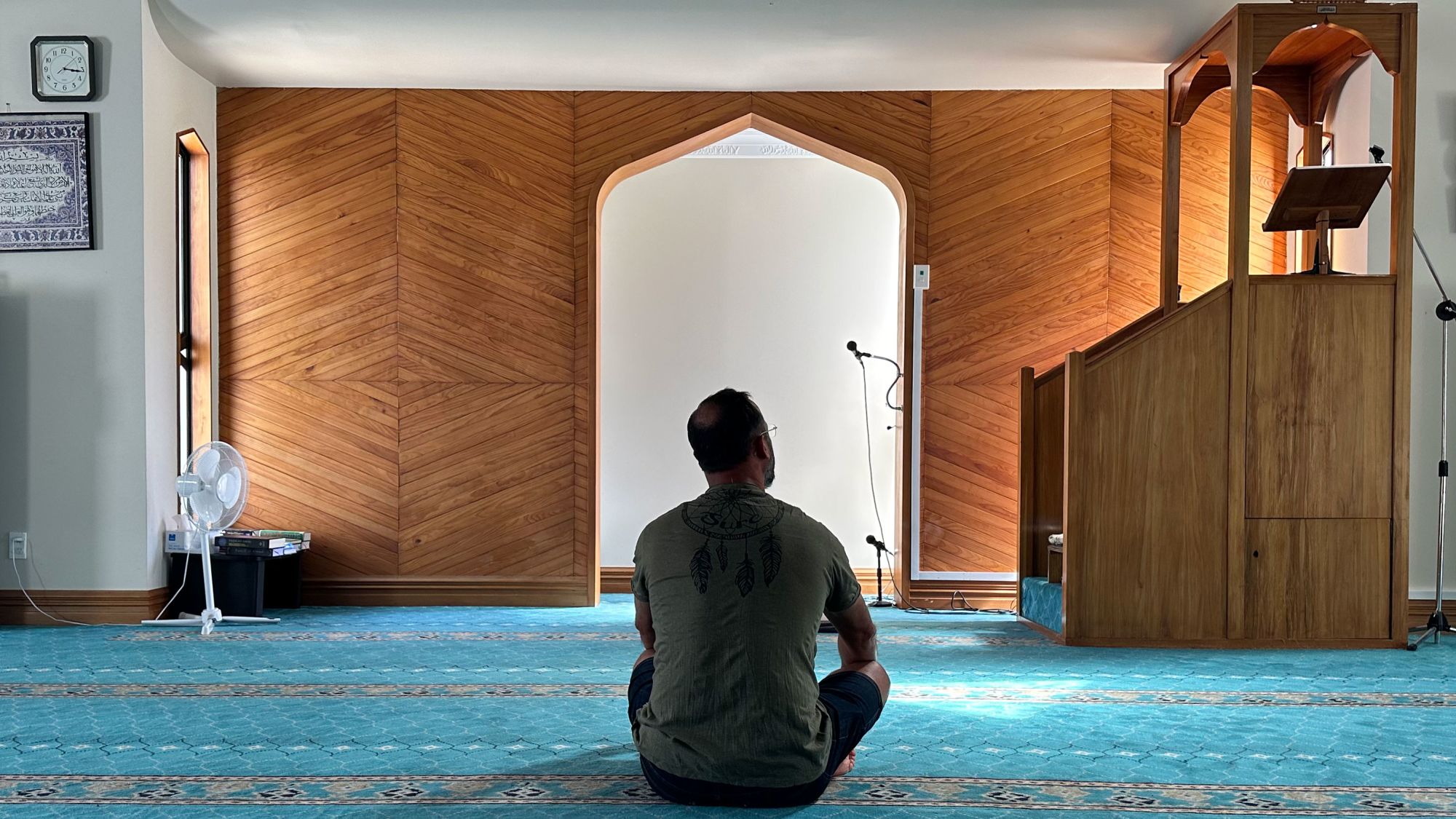Sitting side by side in the mosque’s meeting room, Temel Ataçocuğu and Imam Gamal Fouda hunch over in laughter. To an outsider, they look like two old friends bonding over an inside joke.
Beneath the table, though, Ataçocuğu’s knees bounce nervously. His hands shake. His mouth is dry.
“We are experienced now,” he says, the lightness in his voice defying his anxious glances toward the doors and windows.
“If another terrorist attack happens,” he adds, laughing, “this time we know where to run.”
Fouda chuckles back, helping prop up the humor cloaking the despair in their eyes.
It’s the first time in years Ataçocuğu has stepped foot in Al Noor Mosque, one of two mosques in Christchurch, New Zealand, targeted by a White supremacist on March 15, 2019. The other was Linwood Islamic Centre. The shootings killed 51 people, the youngest just 3 years old.
Ataçocuğu, a doting father and lifelong athlete, was shot nine times in the attack. Fouda, the mosque’s spiritual leader, escaped physical injury by hiding under the podium from which he was giving that day’s sermon.
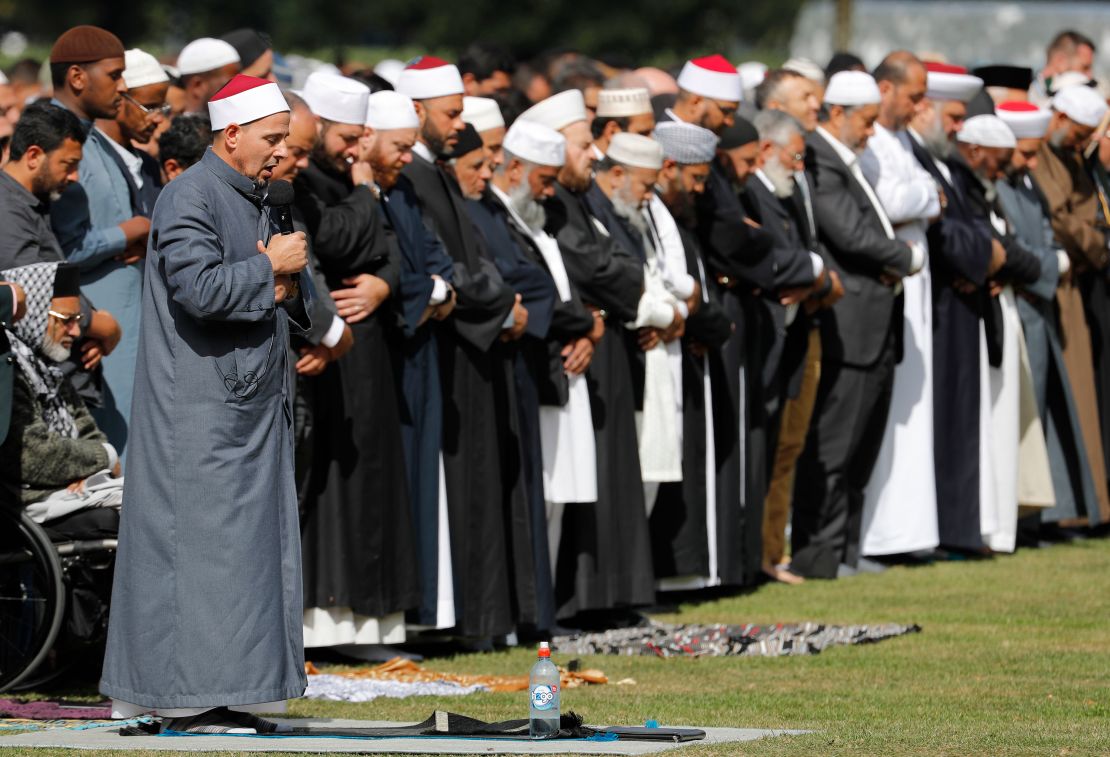
The two haven’t seen each other since shortly after the attack, as Ataçocuğu’s injuries and struggles with post-traumatic stress disorder have kept him away. But today, the two have agreed to meet at the mosque and catch up on five years’ worth of personal news.
“I have what they call green fingers,” Fouda, 48, announces proudly. “But my tomatoes are very green. I’m not sure why they won’t turn red!”
“You have to be patient,” Ataçocuğu, 49, teases. “It takes about —”
BANG.
A loud noise from outside the mosque’s walls suddenly interrupts the moment, freezing Ataçocuğu mid-sentence. The two exchange terrified looks before resuming the conversation, but it quickly takes a dark turn.
The men begin recounting every detail of the 2019 attack – from the sound of the shooter’s footsteps as he entered the sanctuary to the dying words of his victims.
Later, in the prayer room where the massacre took place, they point to spots on the ground where friends once lay dying. Ataçocuğu sits in the exact place he was shot and closes his eyes.
“My brain says stay at home. Don’t go anywhere. Don’t go out in crowds. Don’t go to the mosque,” he says. “When I come to the mosque, I can only hear the sounds of the people dying. Even though the smell is not there anymore, I can still smell the gunpowder. I can still taste my own blood in my mouth.”
Death would have been more merciful, Ataçocuğu says, now with surrender in his voice. But then he remembers all the reasons he has to live.
All the things worth fighting for.
Tending to his garden
In his garden, Ataçocuğu focuses on life and not the terrible memories that haunt him.
He was once a fisherman, a champion amateur athlete, a kebab shop owner, and a talented painter and plasterer. But nerve and muscle damage from the shooting left him partially disabled. He lost some mobility in his left arm and hand, and cannot stand or sit for long periods of time. Strenuous work is no longer possible, so he relies on government assistance to make ends meet.
But behind his home, a modest townhouse on a quiet street in central Christchurch, he’s found purpose in the flowers, succulents, fruits and vegetables he’s planted.
“I used to go out with my friends a lot, was very active physically. I traveled and worked, but now I wake up, I sleep, I watch my documentaries,” Ataçocuğu says. “At least I have my garden.”
Ataçocuğu built everything himself, from the concrete garden boxes to wooden frame plant beds. Little gnomes peek out from behind the plants, just one of Ataçocuğu’s affectionate touches.
A bright smile, punctuated with dimples, appears when he points to his budding plants: chili peppers, tomatoes, mint, lettuce, parsley. His cucumber plant has wilted, he says sadly, but he’s slowly and lovingly nursing it back to health.
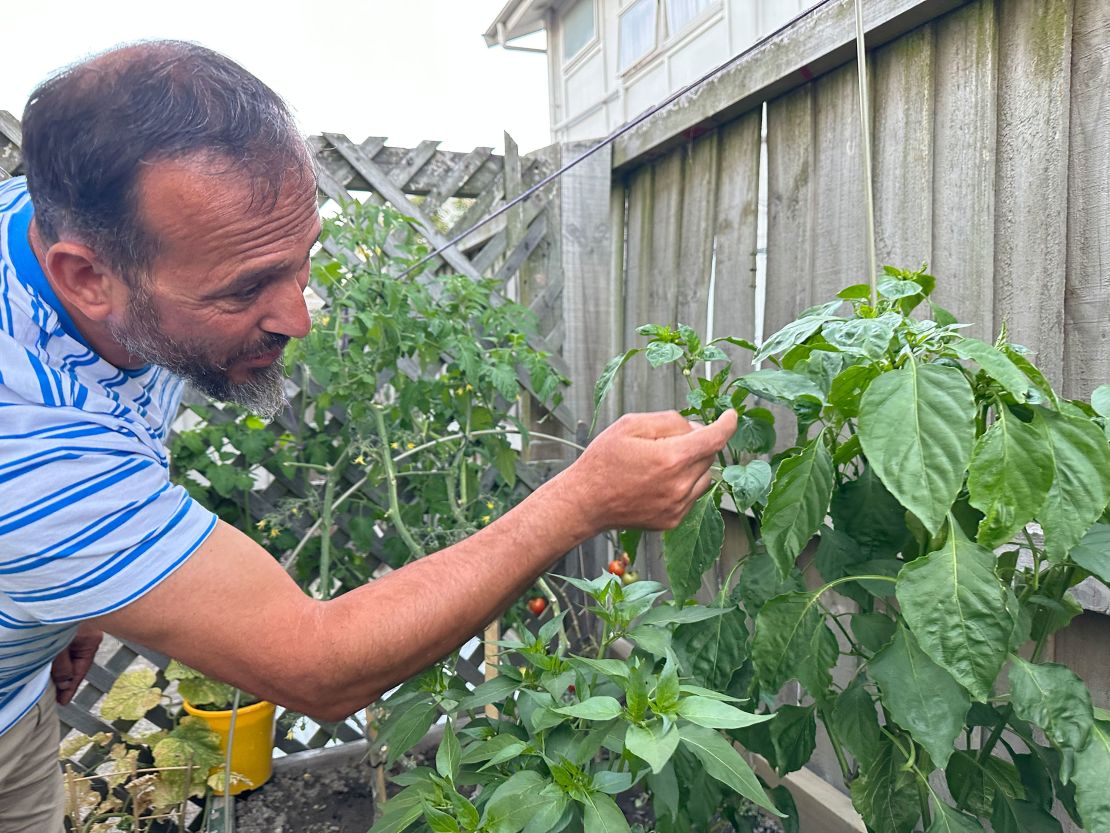
Ataçocuğu’s doctors fixed the holes in his body, but the broken parts of his mind aren’t so easy to repair. His PTSD is so debilitating that he can’t leave his house for long periods because of triggers and flashbacks that induce severe panic attacks.
He sees a therapist and takes medicine for persistent depression. Sleeping pills are supposed to help him relax, but he still lies awake at night ruminating on the graphic details of the shooting and all the ways it knocked his life off course.
In his darkest moments, when his thoughts spiral out of control, he steps into his backyard and tends to his lemon, grapefruit and mandarin trees. It’ll be years before they bear fruit – and he wants to taste them.
In a moment of frustration, Ataçocuğu leans his head back and slowly releases a sigh. He longs to feel normal again, he says, but doesn’t know if or when it’ll happen.
“How? That’s the question, how?” he asks, exasperated. “I try but when I feel good for one day or two weeks, then poof, something has changed and I feel bad again. Two months good, one year bad. I have no energy to carry on with my normal life.”
There are no sutures or surgeries to make his soul whole again. Like the wilting cucumber plant in his garden, nearly dead but slowly returning to its once vibrant form, Ataçocuğu knows he must find a way to water his spirit, lean toward the light and bloom.
Playing soccer again
The only time Ataçocuğu’s flashbacks subside is when he’s on the soccer field.
Only there does he no longer hear the sound of the clock that kept tick, tick, ticking between pauses in gunfire or see shadows of an armed man dressed in tactical gear out the corner of his eye.
“When I play football I don’t think, and when I don’t think I’m happy,” Ataçocuğu says as he ties the laces on his cleats and hops in excitement. Before the shooting, he played the sport competitively with a local team. It’s been a lifeline for him since childhood, he says.
After the shooting, Ataçocuğu was hospitalized for over a month and feared he would never play again. The bullets he took to his legs and knees made it difficult to walk on his own, let alone sprint across a field with a ball.
“I couldn’t imagine life without it. I went from being so healthy to being unable to do basic things. A lot of times I feel useless and hopeless,” he says before pausing. “I don’t know how to explain it, it makes me feel like I’m a loser.”
But for the next few hours, running across the field at Halswell Domain on the outskirts of Christchurch, he is a champion again.
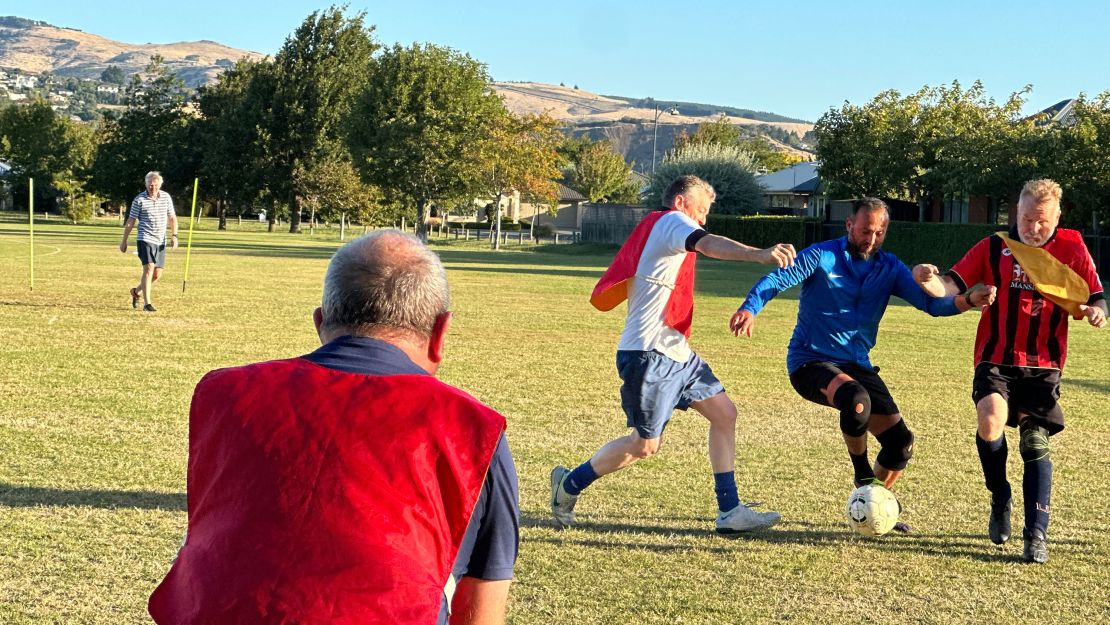
His team, Halswell Walking Football, is a walking soccer club comprised of players with mobility issues – some due to injuries, others old age. They meet once a week to practice a modified version of the game that is safe for everyone to play. Once a month they compete against other walking clubs across the country, sometimes even internationally.
Here, Ataçocuğu is known as a funny, warmhearted and competitive striker, not just a survivor of the Christchurch mosque shootings.
“Some people don’t know what to say or how to act around me. But my team doesn’t look at me with pity or think only about the shooting when they see me,” he says. “When we’re together, it’s about football.”
Midway through practice, Ataçocuğu’s teammates tease him for running when he should be walking, a rule established to prevent further injury and keep the game accessible to all players. When he gains control of the ball and heads for the goal, they erupt in cheers and laughter.
“Go, go, go!” they chant. He takes a shot and misses, but the victory is still his.
As the sun sets, casting a golden hue over the field, Ataçocuğu’s teammates begin packing to leave. But he continues chasing the ball, refusing to let the practice – and the rare peace it brings him – come to an end.
Being a father
Every bullet that pierced through Ataçocuğu reminded him of his children.
As he lay wounded in the prayer room under a pile of bodies, he panicked – not over the pints of blood pouring out of him or the desperate cries for help that enveloped the mosque – but over his two sons, Adem and Sami.
“I can’t die,” he remembers thinking to himself. “I have children!”
Neither of the boys, ages 14 and 12 at the time, were at the mosque during the attack. But the thought of them growing up fatherless was too much to bear.
“I didn’t think about anything else, I was only thinking about my children, my boys,” he says, back at his home in Christchurch, where his niece, Melis Ünal, sits nearby for emotional support. “Not even my mom, not even my sister. I was praying to Allah, give me this chance to survive to look after my kids and not leave them behind.”
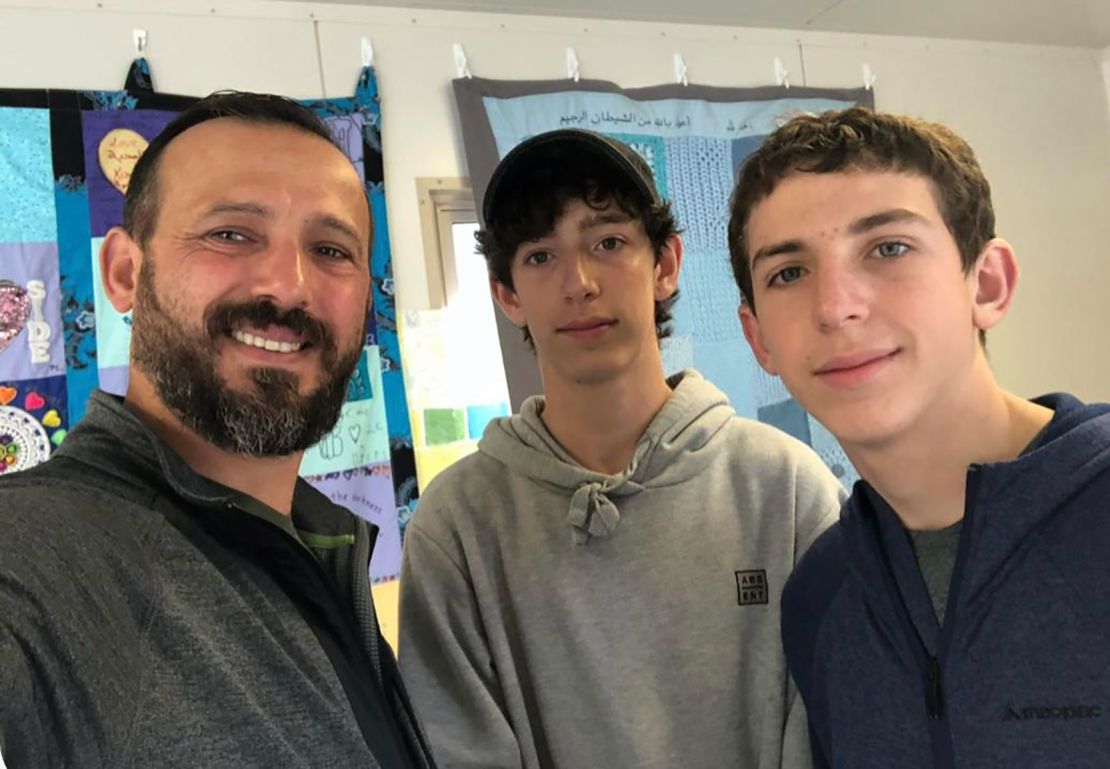
Paralyzed with fear, Ataçocuğu witnessed the shooter kill another man’s child – 3-year-old Mucad Ibrahim – who had been playing with his father a few feet away only moments before. He says it broke him.
Fatherhood is sacred to Ataçocuğu, who dreamed of becoming a dad since the age of 11, when he lost his own.
“It changed me how much I missed him. I was telling myself when I have children, I will be a good father and I will never leave them behind,” he says.
He points to a wolf tattoo on his left shoulder – a bullet wound scar now slices the skin across its face – and speaks of its symbolism. It represents loyalty, strength and a fierce instinct to protect family, he says.
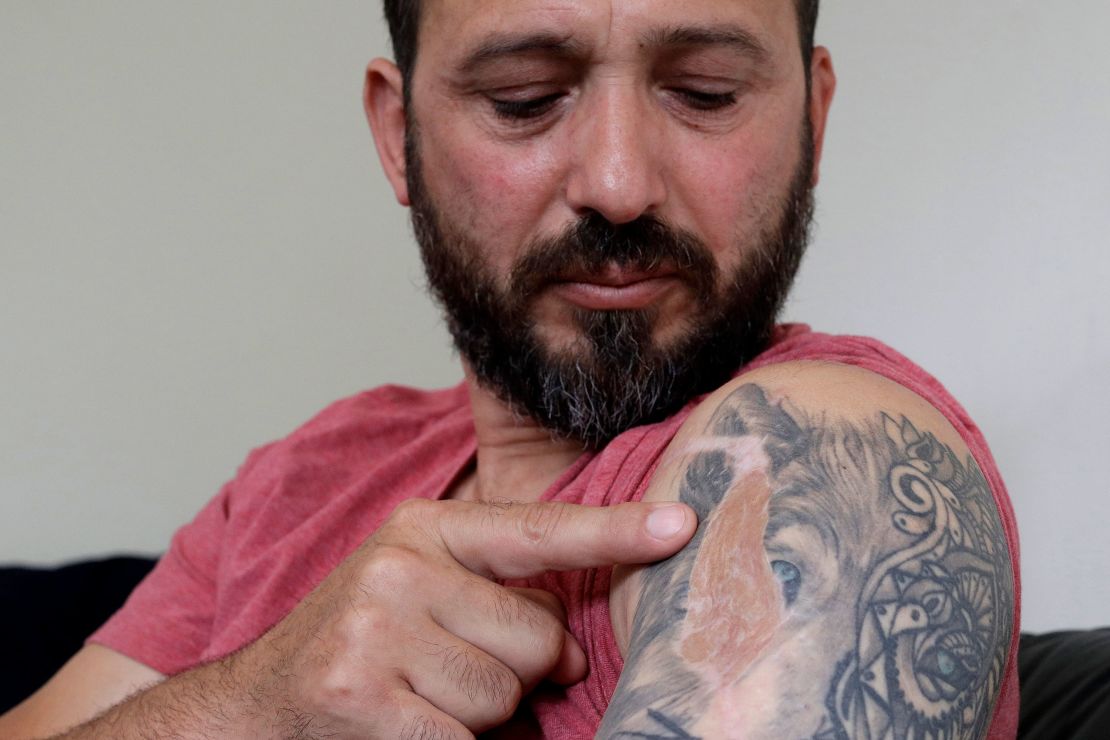
Ataçocuğu glows as he talks about his boys. He’s swiping through hundreds of photos of them on his phone, each representing a cherished memory.
Adem, now 19, is smart, emotional and generous. “Like me, he likes dreaming and loves cars and he wants to be a car mechanic,” Ataçocuğu says proudly. “I love catching up with him and hanging out together.”
Sami, his youngest, is 17 and just as brilliant. He enjoys school, especially math, and wants to be an accountant when he grows up. Ataçocuğu says he’s as stubborn as he is sweet – just like his dad.
Ataçocuğu wants to be present for everything his own father missed – graduations, marriages, grandchildren – even on the days his flashbacks to the shooting make it difficult to get out of bed.
“Why did I live?” he wonders out loud, still swiping through the photos on his phone.
But when he lands on a particularly endearing one of Adem and Sami, and hugs it close to his chest, the answer couldn’t be more obvious.
